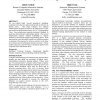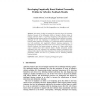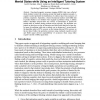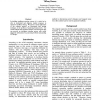326 search results - page 5 / 66 » Can Affect Be Detected from Intelligent Tutoring System Inte... |
CHI
2000
ACM
14 years 12 hour ago
2000
ACM
We can reliably build “second generation” intelligent computer tutors that are approximately half as effective as human tutors. This paper evaluates two interface enhancements...
ITS
2010
Springer
14 years 13 days ago
2010
Springer
The impact of affect on learning has been the subject of increasing attention. Because of the differential effects of students’ affective states on learning outcomes, there is a ...
AIED
2009
Springer
13 years 5 months ago
2009
Springer
In previous works, we showed how sequential pattern mining can be used to extract a partial problem space from logged user interactions for a procedural and ill-defined domain wher...
EDM
2010
13 years 9 months ago
2010
Functional magnetic resonance imaging (fMRI) data were collected while students worked with a tutoring system that taught an algebra isomorph. A cognitive model predicted the distr...
FLAIRS
2006
13 years 9 months ago
2006
In building intelligent tutoring systems, it is critical to be able to understand and diagnose student responses in interactive problem solving. We present a novel application of ...




